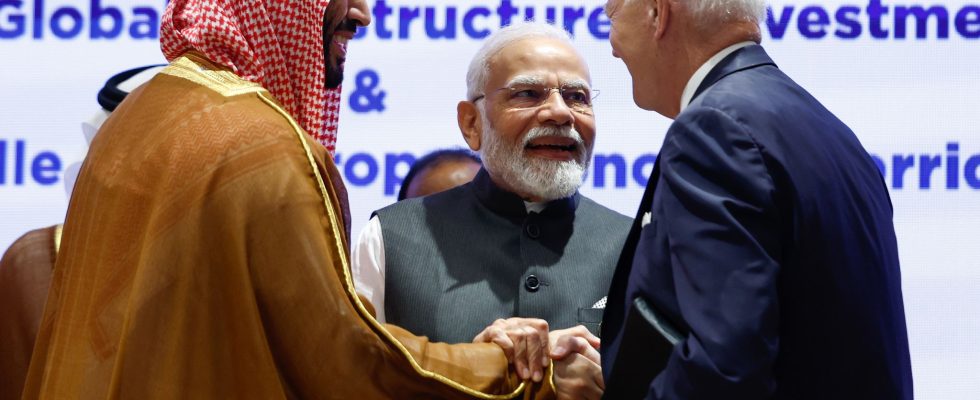Is Joe Biden, with India, France, Germany, Saudi Arabia, the EU, the United Arab Emirates and Italy, drawing the contours of a new “road to silk” ? On the sidelines of the 18th G20 summit held in New Delhi, the United States proposed an ambitious logistics corridor project linking India, Europe and even the Middle East.
On Saturday, representatives of the seven countries and the EU have already signed an agreement in principle in New Delhi, during the G20 summit, according to a Press release from the White House which announces “a new era connected from Europe to Asia via the Middle East”.
Washington’s objective: to create commercial nodes while encouraging the development of clean energy. The project also mentions the installation of submarine cables, and even a hydrogen corridor which would connect the Emirates, Saudi Arabia and Israel through the port of Haifa, but also Europe. “It’s really important,” commented American President Joe Biden, adding that it is “historic,” during a round table bringing together the leaders concerned. It is “much more than ‘just’ rail or cable”, underlined the President of the European Commission, Ursula von der Leyen, referring to “a green and digital bridge between continents and civilizations”.
India, for its part, welcomed on Monday a “strategic” partnership with Saudi Arabia as part of an ambitious logistics “corridor” project linking India and Europe to the Middle East, unveiled on Saturday at the summit of G20 in New Delhi. “Together, we have made a historic start by establishing an economic corridor,” Indian Prime Minister Narendra Modi told Saudi Crown Prince Mohammed bin Salman the day after the summit.
A calendar still unclear
Israeli Prime Minister Benjamin Netanyahu said the United States approached Israel several months ago about the project, which he said would “reshape the face of the Middle East.” “The State of Israel will be a hub for this economic initiative,” he reacted Saturday evening in a press release. The city of Marseille was also mentioned several times as being at the heart of discussions.
The timetable for this major infrastructure project remains unclear. No investment amount has otherwise been communicated. However, it is part of an initiative launched last year at the G20 summit in Bali with US President Joe Biden, called the Global Infrastructure and Investment Partnership (GIIP).
With this announcement, the American president is also trying to occupy the space left vacant by China, absent from this G20. Indeed, Beijing is developing a “new Silk Roads” program through massive investments in infrastructure in several developing countries. A program widely criticized by the White House.
Countering the “BRI” launched by Beijing
If the project to connect India to Europe via various countries in the Middle East was really “concrete, it would change the rules of the game”, judged in a message on X (ex-Twitter) Michael Kugelman, expert at the Wilson Center in Washington, and this would “aim to counter the BRI”.
The “Belt and Road Initiative” is the acronym in English for the so-called “New Silk Roads” program through which Beijing has been making massive investments in a number of developing countries to build infrastructure for nearly 10 years. Its opponents denounce a “Chinese Trojan horse”, intended to obtain political influence, and criticize the debt it imposes on poor countries. Joe Biden called it a “debt and confiscation program” in June.
“In this idea (of a new logistics corridor), there is competition with the ‘Silk Roads'”, confirmed to Agence France Presse (AFP) a French diplomatic source, for whom the announcement from Delhi is “just the beginning of a long story”.
